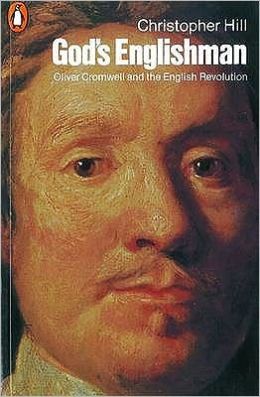Last night 16 members of the Book Club met to discuss God's Englishman: Oliver Cromwell and the English Revolution by Christopher Hill. We kicked off the discussion suggesting that the 17th century might, as Hill suggests, have been a decisive century in English history; in 1600 there were still traces of the Middle Ages in British society, but by 1700 Britain was ready to enter into the age of the Industrial Revolution.
It was suggested that Hill may have painted too favorable a picture of Cromwell, excusing his changes in policy and, for example, treating his Irish war too favorably. Surely the Irish see Cromwell as a far more sinister character than that described in this book.
We discussed Cromwell's rise to power. Starting as a member of the lesser branch of a well connected but only locally powerful family, he rose through Parliamentary duties and -- more importantly -- his military career. Blessed with a talent for tactics, he rose to be general in command of the New Model Army, than overall commander, and ultimately Protector of England with more power than the deposed monarch.
Cromwell rose through the English Civil War (1641-1649), the invasion and subjugation of Ireland and the war with Scotland. He pursued a pro trade policy and his western strategy resulted in the British acquisition of Jamaica from Spain in 1655 (and the shipment of tens of thousands of Irish to Jamaica). Yet his death was quickly followed by the Glorious Revolution; two years after his death his body was exhumed and hanged. We wondered about the sources of his policy preferences and managerial abilities.
We noted the chapter in the book which demonstrated that people writing about Cromwell over the centuries have come to very different conclusions about his character and intentions. It was noted that he was pragmatic, and that while he listened to others he held his own council. Ultimately we did not understand the man very well.
We spent considerable time discussing the religious situation in Britain in the 17th century. There was a deep anger between the Catholics and Protestants, a competition for the nature of the Anglican church, and considerable conflict between the many groups of Dissenters considering migrating to the American colonies where his friend Roger Williams was making his own life.
We also noted the economic bases of the conflicts, noting how much property changed hands during the Civil War and the related turmoil. We discussed the enclosure movement and the Levelers movement. We also noted that the little ice age was creating havoc in European agriculture in the early part of the 17th century. The emergence of the local squires as more powerful as a result of the civil war (and the monarchy and aristocracy as being restored in power at the end of the century). For many, the priority in those times may have been simple survival and protection of what they had.
There are several members present with considerable interest in military history and we spent some time discussing the New Model Army, a standing army of well trained and paid troops that produced victory in the Civil War for the Parliamentary side.
Several of the members said that they found the book hard to read, largely because it assumed more background information than we possessed. One member drew upon Antonia Fraser's Cromwell which she had previously read. One member said she liked the book, another said that it had stimulated him to read a lot of other related material. One of the members had previously distributed the following references via the club's Yahoo Listserve.
Another brought a copy of the Wikipedia Cromwell entry.
One of the members has posted a review of the book.
Following the discussion of the book, there was a discussion of future readings. The books previously chosen are Manias, Panics and Crashes: A History of Financial Crises by Charles P. Kindleberger and Robert Z. Aliber (April 10) and The Conquerors: Roosevelt, Truman and the Destruction of Hitler's Germany, 1941-1945 by Michael Beschloss (May 8(. Last night we selected American Dreamer: The Life of Henry A. Wallace by John C. Culver for future reading (June 12).
We discussed further readings. There continues to be interest in finding a book on the history of a church or religious movement, but it was hoped that such a book would be of modest size and well written as well as dealing with a limited period of time. There continues to be interest in reading about history in regions we have not yet touched, with specific recommendations about recent Russian history. And of course there continues to be interest in American history. The "possible future reading" list will soon be updated to reflect these priorities.

No comments:
Post a Comment